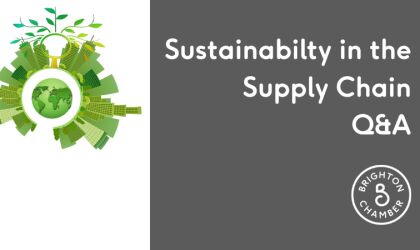

Wed 09 / 06 / 21
What is Net Zero Carbon and is it important to my business?
Steve Creed of Circular Brighton and Hove explains what Net Carbon Zero is, and how you can takes steps to reduce your business' carbon footprint.
By Steve Creed of Circular Brighton & Hove
Getting out and enjoying our new freedoms as the UK has been emerging from lockdown has been hampered by one of the wettest months of May on record as anyone who braved a pub beer garden earlier in the month can testify. A reminder that Covid-19 is not the only threat our current lifestyle is facing. Few people now deny the climate is changing. The scientific evidence clearly points to the significant increase in emissions of greenhouse gases resulting from human activity as the cause of this climate change.
According to the UN a rise of more than 1.50 C would result in a “Catastrophic Disaster”. Brighton and Hove City Council has declared a Climate Emergency as have many other public organisations. In 2019 the UK government became the first major nation to set official targets to achieving net zero carbon emissions by 2050.
What does net zero carbon mean? It’s a simple equation:
When Greenhouse gases emitted = Greenhouse gases extracted then Net Zero Carbon is achieved
Think of it like a Profit and Loss account, emitting greenhouse gases into the atmosphere is the equivalent of costs and extracting greenhouse gases from the atmosphere is the equivalent of generating revenue. In any business the first step to success is breaking even which is the stage that is being targeted to overcoming climate change. The long-term objective is to become profitable or in climate terms carbon positive (extracting more than is emitted).
It might not seem like the best time to be taking on climate change as we are all recovering from the pandemic. However, I would disagree it could be the best time. We will all have to change some aspects of our business to both survive and adapt to the post Covid world. In fact, as you will see some changes might even help to ensure our survival by positively impact on our actual P&L account.
Start with a few small steps. How are you using your electricity? LED lighting, for example, uses on average 80 per cent less energy than most traditional bulbs, bringing down a company’s overall energy use and consequently, its carbon emissions while saving money. Or just switch off all your computers, while it may seem trivial, leaving 50 computers on overnight for a year would create enough carbon dioxide (CO2) to fill a double-decker bus and cost a business over £600 a year. Is your electricity provided from renewable sources? If not, it is a simple transition to make and unlikely to make a significant impact on cost of supply.
Do you have a fleet of company cars? The United Kingdom will ban the sale of new combustion-engine vehicles by 2030. It will also ban the sale of new hybrid cars by 2035. To accelerate this transition HMRC are currently providing a big tax incentive for company car drivers who benefited from 0% company car tax in 2020-21, rising to 2% in 2022-23 and remaining at that level until 2024-25. That compares to rates of up to 37% company car tax on the most highly taxed models. There are additional benefits for the business as well which are covered here. If you would like to see what is available on the market head down to Madeira Dr on the Brighton seafront on July 18th where all the electric vehicles (EVs) that participated in the inaugural London to Brighton EV Rally will be on display.
It is unlikely you will be able to reduce your businesses carbon footprint to nothing just as there are always costs to run a business. However, you can offset greenhouse gas emissions by funding planting trees which will absorb carbon from the atmosphere. Something Propellernet a local Brighton business is currently doing on the journey to becoming carbon positive. There are many providers here is one. Or possibly investing in Kelp farms which are starting to appear along the South Coast of England, like this start-up.
Once you have taken a few small steps you may want to start to measure the impact of your actions and report them. The UK government has produced an excellent guide you can find here.
Circular Brighton and Hove, a collaboration between the Eco-Dinner Club and the Circular Economy Club, is working to support the transition to a circular economy in Greater Brighton.
Find out more here.
If you want to contribute to the Chamber blog, contact us on hannah@brightonchamber.co.uk



